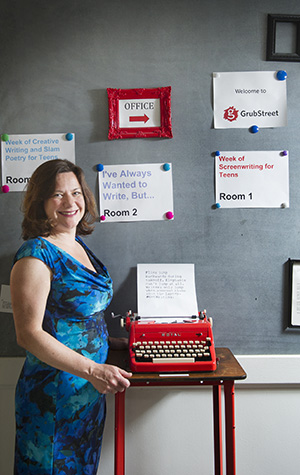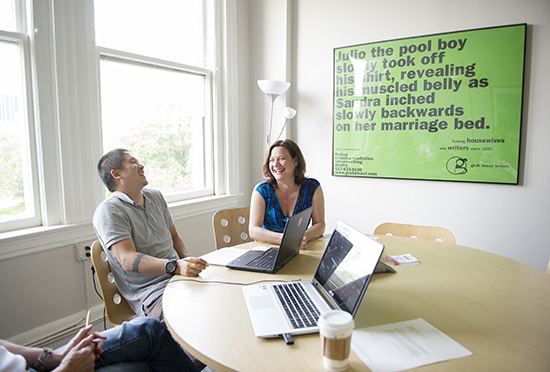Writing Your Way to a Better You
GrubStreet founder says getting published isn’t the only goal

GrubStreet, the creative writing center in downtown Boston, was started to help people write better and perhaps even get published. But founder and executive director Eve Bridburg says it’s more than that.
“The first time I even started thinking this way was when a woman named Bonnie Levy, who lived in Brookline, came up to me,” says Bridburg (GRS’97). “She had taken a few classes, and she said, ‘GrubStreet changed my life.’ I remember going home and telling my husband, ‘Bonnie Levy’s crazy.’”
Bridburg laughs at the memory. But Levy—still a GrubStreet member—was just the first of many.
“They say, ‘I’m a better person.’ ‘I don’t look at the world the same way,’” Bridburg says. “The act of writing narrative has had a healing effect on them.”
The original Grub Street was a seedy neighborhood of 18th-century London, peopled by hack writers and less than respectable publishers. The new GrubStreet, founded in 1997 and a nonprofit since 2002, is a workshop that offers writing classes in a warren of rooms at 162 Boylston St., above the Steinway piano store. The center’s name is a wry acknowledgment of the hard work and usually low pay that are the lot of writers. The mission? “To be an innovative, rigorous, and welcoming community for writers who together create their best work, find audience, and elevate the literary arts for all,” according to the GrubStreet website.
It all started with Bridburg tacking up flyers around Brookline to advertise a couple of writing workshops held at a synagogue and later a bookstore. These days, more than 3,000 people a year turn up for programs, from summer teen workshops and memoir sessions for seniors to the wildly popular annual Muse and the Marketplace conference. About 100 local writers teach at least one class a year, and 10 permanent staffers keep it all running.
Dozens of GrubStreet writers have gone on to publishing success. They include E. B. Moore (An Unseemly Wife), Patricia Park (Re Jane), and GrubStreet artistic director Christopher Castellani (GRS’00) (the finale of his trio of novels about an Italian immigrant family, All This Talk of Love, was published in 2013). Many of them have been through GrubStreet’s yearlong Novel Incubator program and/or its new Launch Lab.
Bridburg, who left for a few years to work as a literary agent and returned in 2010, is less impressed with GrubStreet’s success stories than with the way its workshops can change people’s lives.
“They figured out something they needed to figure out or they healed from something that they really needed to express,” she says in a GrubStreet conference room overlooking Boston Common. “They have made friendships with people they never would have connected to, because they’re writing together in a group and understood a perspective they never would have understood, which is one of the great gifts of reading books….There’s nothing that helps us relate to other people like walking in their shoes, and narrative can do that like no other art form can.”

Both she and Castellani say that the supportive atmosphere at GrubStreet is a deliberate antidote to what Castellani calls the “praise or blame” culture that they sometimes encountered in graduate workshops in the 1990s.
“It may not seem radical to most people,” he says, “but Bridburg’s guiding principle that excellent writing can be developed from a workshop that is both rigorous and supportive, and that accommodates writers of different genres and ambitions and levels of ability, is not something every writing teacher believes.”
GrubStreet is not designed to fast-track the obviously talented to success, Bridburg says, but to make everyone who comes through the door a better writer.
“It means being nonpaternalistic and meeting people where they are,” she says. “Some people never produce or publish anything, and other people get to Penguin. And there’s everything in between.”
The center earns 70 to 75 percent of its $1.8 million annual operating budget from tuition and fees, with the remainder coming from grants and philanthropy from both public and private sources, including the National Endowment for the Arts and the Massachusetts Cultural Council, she says.
GrubStreet will likely be moving soon, as the building has been sold and the rent will be going up. It’s not hard to picture the center thriving in Somerville or a developing neighborhood like Upham’s Corner. But Bridburg says GrubStreet has strong reasons to stay downtown, including its role in the development of Boston’s Literary Cultural District and its central location on the public transportation grid, and remaining in the area is more likely.
“We want to be really sure that narrative remains relevant, alive, and thriving,” Bridburg says. “We’re pretty middle-aged here, and we want to attract a younger crowd. We’re also pretty white, and we want to attract a more diverse crowd. We love what we do, and we think we’re pretty good at it. We just want to include more people and do our part to make sure that the work that’s getting out is representative of the world we live in.”
Alumni and students are invited to Writers Helping Writers: A Conversation with Eve Bridburg (GRS’97) October 22 at 6 p.m. in the Backcourt at the George Sherman Union. Bridburg and Karl Kirchwey, a CAS professor and director of the Creative Writing Program, will talk about what it takes to become a writer. Admission is $10 for alumni, guests, and other BU community members, free for current students. Register here.
Comments & Discussion
Boston University moderates comments to facilitate an informed, substantive, civil conversation. Abusive, profane, self-promotional, misleading, incoherent or off-topic comments will be rejected. Moderators are staffed during regular business hours (EST) and can only accept comments written in English. Statistics or facts must include a citation or a link to the citation.